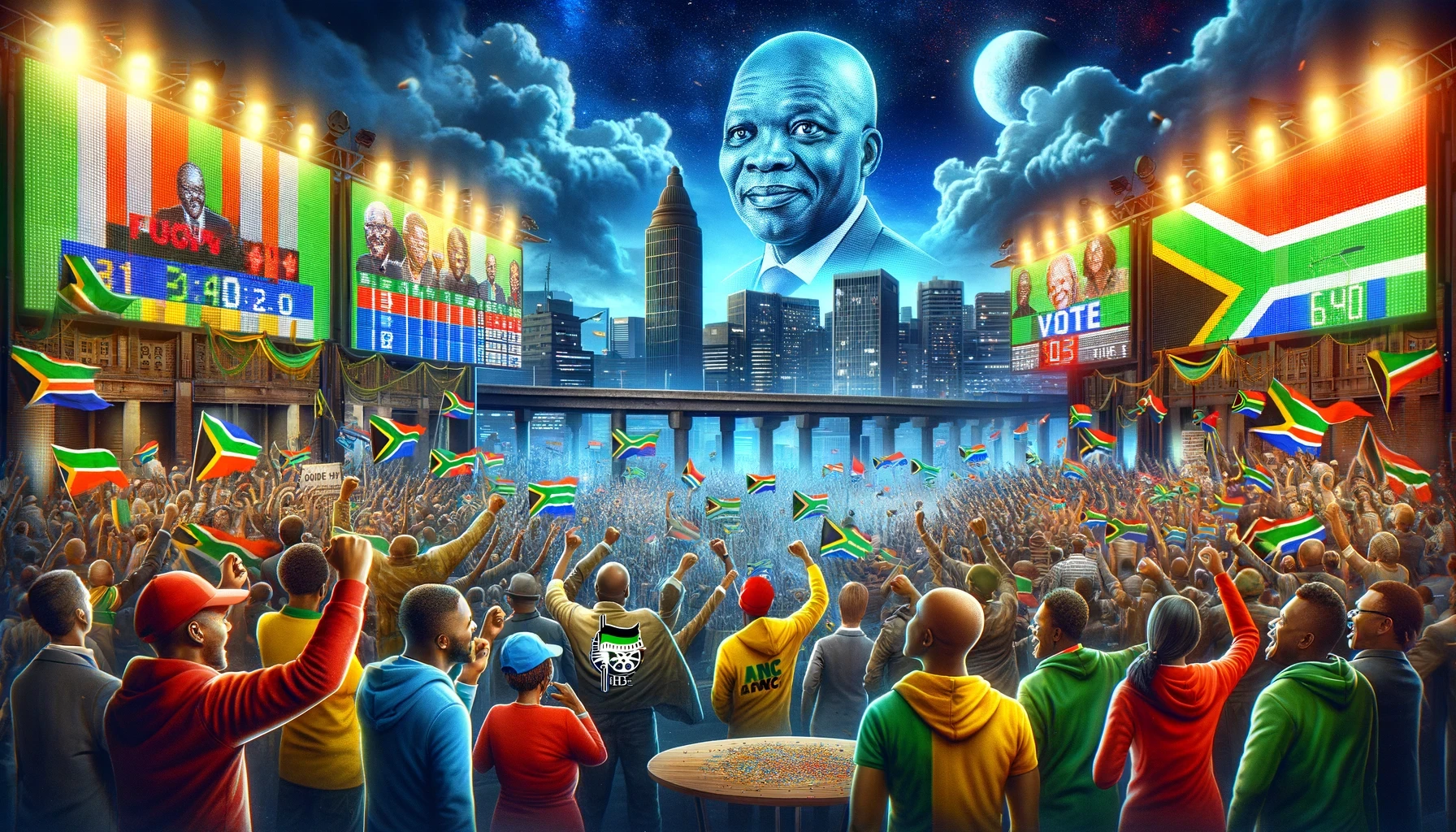In a historic turn of events, the African National Congress (ANC) has lost its parliamentary majority for the first time since the end of apartheid 30 years ago. This significant shift in South African politics was confirmed as more than 99% of the votes were counted from the May 29, 2024, general election. The ANC, which has been the dominant political force since 1994, secured just over 40% of the vote, well short of the majority needed to govern alone.
Election Results and Political Landscape
The ANC’s vote share plummeted from 57% in the 2019 election to just 40% in 2024. This drop underscores a dramatic decline in support for the party that once symbolized the fight against apartheid and the hope for a better future under Nelson Mandela. The Independent Electoral Commission (IEC) is expected to formally declare the final results, but it is clear that the ANC will need to seek coalition partners to form a government.
The main opposition party, the Democratic Alliance (DA), garnered 21.63% of the vote, maintaining its position as the second-largest party. Meanwhile, the newly formed uMkhonto we Sizwe (MK) party, led by former president Jacob Zuma, achieved a surprising third place with 14.71% of the vote. The Economic Freedom Fighters (EFF) secured 9% of the vote, rounding out the top four parties.
Reactions from Political Leaders
Opposition leaders have celebrated the election outcome as a monumental victory for South Africa’s democracy. “The way to rescue South Africa is to break the ANC’s majority and we have done that,” declared John Steenhuisen, leader of the DA. Julius Malema, leader of the EFF, echoed this sentiment, stating that the ANC’s era of dominance has ended.
Jacob Zuma’s MK party, which has drawn significant support from disaffected ANC voters, particularly in the KwaZulu-Natal province, has also positioned itself as a critical player in the upcoming coalition negotiations. Zuma, despite being barred from holding office due to a corruption conviction, remains a formidable force in South African politics. “We are willing to negotiate with the ANC, but not the ANC of Cyril Ramaphosa,” said MK spokesperson Nhlamulo Ndlela.
Challenges Ahead
The formation of a coalition government will be a challenging task. The ANC must navigate complex political dynamics and negotiate with parties that have divergent ideologies and agendas. “We can talk to anybody and everybody,” said ANC Chairman Gwede Mantashe, indicating the party’s willingness to explore various coalition possibilities.

An alliance with the DA, a centrist, business-friendly party, would be unprecedented and fraught with potential conflicts, especially given their differing views on economic policies and foreign relations. On the other hand, a coalition with the MK and EFF, both of which have roots in the ANC and advocate for more radical economic reforms, could also prove volatile.
Socio-Economic Context
The ANC’s decline can be attributed to several socio-economic factors plaguing South Africa. The country remains one of the most unequal in the world, with a staggering unemployment rate of 32%. Poverty and inequality, particularly among the Black population, continue to be pervasive. The ANC government has also faced criticism for its failure to provide basic services, such as water and electricity, and for widespread corruption.
Tessa Dooms, a director at the Rivonia Circle think tank, described the election as a watershed moment that fundamentally changes South African politics. “On the one hand, we overcame apartheid as a structural force,” Dooms said, “On the other hand, we have not actually changed many of the dynamics. We inherited inequality of one form, and we have doubled down on inequality in South Africa in another form going forward and it has hurt us”.
The Rise of Jacob Zuma and the MK Party
Jacob Zuma’s political comeback through the MK party has been one of the most notable developments in this election. The MK party, named after the disbanded military wing of the ANC, was formed only six months ago but has quickly gained traction among former ANC supporters and the Zulu ethnic group, which forms Zuma’s base. Despite his legal troubles, Zuma’s influence remains strong, and his party’s performance has reshaped the political landscape.
Looking Ahead
As South Africa prepares for a new era of coalition governance, the ANC’s ability to form a stable government will be crucial. The party’s internal divisions and the need to negotiate with potential coalition partners will test its leadership and political acumen. President Cyril Ramaphosa, who faces significant pressure from both within and outside his party, must navigate these challenges to secure his position and govern effectively.
The election has also highlighted the demand for greater accountability and effective governance in South Africa. The ANC’s transition from a liberation movement to a governing party has been marked by significant achievements, but also by growing discontent among the population. The need to address economic inequality, improve public services, and combat corruption will be critical for the new government.
This article is based on the following articles:
https://apnews.com/article/south-africa-election-vote-anc-d9da7582ca98a4e00fec2da6a5fe1e91#
https://www.npr.org/2024/06/01/nx-s1-4987616/south-africa-election-results

Background Information
Apartheid and the ANC’s Rise to Power
Apartheid was a system of institutionalized racial segregation and discrimination in South Africa that lasted from 1948 to 1994. Under apartheid, the government, led by the National Party, enforced policies that privileged the white minority at the expense of the Black majority and other racial groups. The apartheid system segregated public facilities, education, employment, and residential areas, leading to significant economic and social disparities.
The African National Congress (ANC) was founded in 1912 and became the leading political organization opposing apartheid. The ANC, along with other anti-apartheid groups, fought for decades against the apartheid regime through both peaceful protests and armed resistance. This struggle included the efforts of prominent leaders such as Nelson Mandela, who was imprisoned for 27 years for his activities against apartheid.
In 1990, under international and internal pressure, the South African government began dismantling apartheid laws. In 1994, South Africa held its first democratic elections where all races could vote. The ANC won a significant majority, and Nelson Mandela became the country’s first Black president. This election marked the end of apartheid and the beginning of a new era for South Africa.
The ANC’s Dominance and Challenges
Since 1994, the ANC has been the dominant political force in South Africa, winning every general election with a majority. However, over the years, the party has faced increasing criticism and challenges:
- Corruption and Scandals: Several ANC leaders have been implicated in corruption scandals, which have eroded public trust in the party. Former President Jacob Zuma, who led the ANC from 2007 to 2018, faced numerous corruption charges, leading to his resignation.
- Economic Inequality: Despite some progress, South Africa remains one of the most unequal countries in the world. The legacy of apartheid has left a significant portion of the Black population in poverty, with limited access to quality education, healthcare, and employment opportunities.
- Unemployment and Public Services: The official unemployment rate in South Africa is around 32%. Many South Africans, particularly young people, struggle to find jobs. Additionally, the government has been criticized for failing to provide basic services such as reliable electricity and clean water.
- Internal Divisions: The ANC is not a monolithic party; it consists of various factions with differing ideologies and priorities. These internal divisions have often led to conflicts and inconsistent policy implementation.
Key Political Parties and Figures
Democratic Alliance (DA): The DA is the main opposition party in South Africa. It is a centrist party that advocates for liberal economic policies and is seen as business-friendly. The DA has been critical of the ANC’s handling of the economy and corruption.
Economic Freedom Fighters (EFF): The EFF is a left-wing political party founded by former ANC Youth League leader Julius Malema in 2013. The party advocates for radical economic reforms, including the nationalization of mines and banks and the expropriation of land without compensation.
uMkhonto we Sizwe (MK) Party: Named after the former armed wing of the ANC, the MK party was established by former President Jacob Zuma. The party draws support from Zuma’s followers, particularly in the Zulu ethnic group, and has positioned itself as a critic of the current ANC leadership.
Cyril Ramaphosa: Ramaphosa is the current president of South Africa and leader of the ANC. He succeeded Jacob Zuma in 2018 and has faced the challenge of uniting the party and addressing the country’s economic and social issues.
Jacob Zuma: Zuma served as president from 2009 to 2018. His tenure was marked by numerous corruption allegations and scandals, which eventually led to his resignation. Despite his legal troubles, Zuma remains an influential figure in South African politics.
South Africa’s Electoral System
South Africa uses a proportional representation (PR) system for its national and provincial elections. In this system, parties receive seats in the National Assembly in proportion to the number of votes they receive. This allows for a wide range of political parties to be represented in the legislature, fostering a multi-party democracy.
The 2024 General Election
The 2024 general election was notable for several reasons:
- Decline in ANC Support: For the first time since 1994, the ANC failed to secure a majority of the vote, receiving just over 40%. This significant decline reflects growing public dissatisfaction with the party’s performance.
- Rise of the MK Party: The MK party, led by Jacob Zuma, emerged as a significant force, securing nearly 15% of the vote. This was a surprising development given the party’s recent formation.
- Coalition Government: With no party achieving a majority, South Africa is entering an era of coalition government at the national level. This means the ANC will need to partner with other parties to form a stable government, a first in the country’s history.
- Voter Turnout and Engagement: The election saw a turnout of around 60%, indicating strong voter engagement despite the challenges facing the country. The high turnout reflects the desire of many South Africans to influence the direction of their country’s politics.
Moving Forward
The formation of a coalition government will be a complex process, requiring negotiation and compromise among parties with differing agendas. The ANC’s ability to navigate these negotiations and address the pressing socio-economic issues will be critical for its future.

Debate/Essay Questions
- What are the potential advantages and disadvantages of a coalition government compared to a single-party majority government?
Please subscribe to Insight Fortnight, our biweekly newsletter!
